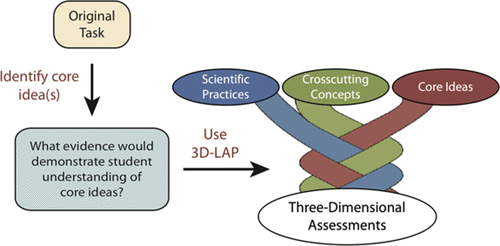当前位置:
X-MOL 学术
›
J. Chem. Educ.
›
论文详情
Our official English website, www.x-mol.net, welcomes your
feedback! (Note: you will need to create a separate account there.)
Adapting Assessment Tasks To Support Three-Dimensional Learning
Journal of Chemical Education ( IF 2.5 ) Pub Date : 2017-12-12 00:00:00 , DOI: 10.1021/acs.jchemed.7b00645 Sonia M. Underwood 1 , Lynmarie A. Posey 2 , Deborah G. Herrington 3 , Justin H. Carmel 1 , Melanie M. Cooper 2
Journal of Chemical Education ( IF 2.5 ) Pub Date : 2017-12-12 00:00:00 , DOI: 10.1021/acs.jchemed.7b00645 Sonia M. Underwood 1 , Lynmarie A. Posey 2 , Deborah G. Herrington 3 , Justin H. Carmel 1 , Melanie M. Cooper 2
Affiliation

|
As chemists, we understand that science is more than a set of disconnected facts. It is a way of investigating and understanding our natural world that involves things like asking questions, analyzing data, identifying patterns, constructing explanations, developing and using models, and applying core concepts to other situations. This paper uses the concept of three-dimensional (3D) learning, presented in A Framework for K-12 Science Education, to reconceptualize and develop assessment items that require students to integrate chemistry core ideas with scientific practices and crosscutting concepts. Developing 3D assessments from scratch is time-consuming and beyond the scope of most faculty work. Here we present an alternate approach: We provide a detailed description of ways in which instructors can take current assessment questions and modify them to align with three-dimensional learning by focusing on the evidence that is sought about what students know and can do with their knowledge.
中文翻译:

调整评估任务以支持三维学习
作为化学家,我们理解科学不仅仅是一组相互联系的事实。这是一种调查和理解我们的自然世界的方式,涉及诸如提问,分析数据,识别模式,构造解释,开发和使用模型以及将核心概念应用于其他情况之类的事情。本文使用在K-12科学教育框架中提出的三维(3D)学习概念,以重新概念化和开发评估项目,要求学生将化学核心思想与科学实践和跨领域概念相结合。从头开始开发3D评估非常耗时,而且超出了大多数教师的工作范围。在这里,我们提出了另一种方法:我们详细介绍了教师如何着手解决当前的评估问题,并通过关注针对学生所知道的知识以及可以利用其知识做什么的证据来修改这些知识,以使其与三维学习保持一致。 。
更新日期:2017-12-12
中文翻译:

调整评估任务以支持三维学习
作为化学家,我们理解科学不仅仅是一组相互联系的事实。这是一种调查和理解我们的自然世界的方式,涉及诸如提问,分析数据,识别模式,构造解释,开发和使用模型以及将核心概念应用于其他情况之类的事情。本文使用在K-12科学教育框架中提出的三维(3D)学习概念,以重新概念化和开发评估项目,要求学生将化学核心思想与科学实践和跨领域概念相结合。从头开始开发3D评估非常耗时,而且超出了大多数教师的工作范围。在这里,我们提出了另一种方法:我们详细介绍了教师如何着手解决当前的评估问题,并通过关注针对学生所知道的知识以及可以利用其知识做什么的证据来修改这些知识,以使其与三维学习保持一致。 。











































 京公网安备 11010802027423号
京公网安备 11010802027423号